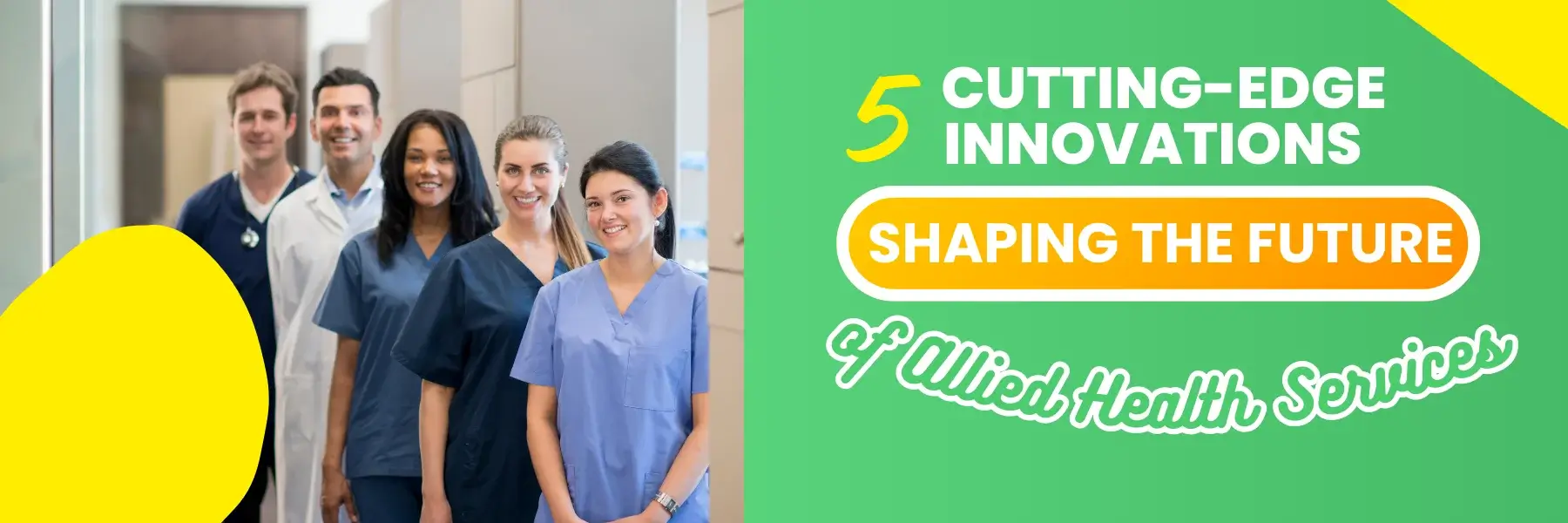Being part of the NDIS community is already challenging, so providing a means to make things easier for NDIS participants is a good act. Fortunately, apart from doctors, nurses, and other specialists, some people take tending to NDIS participants seriously. They are the team of Allied Health- a strong force supporting the NDIS participants.
Allied Health is a team of health workers making life better for participants. Various types of Allied Health workers exist, some are physiotherapists, chiropractors, and speech therapists. They are important in making sure participants are getting along in their healing journey.
This article will give you more understanding of Allied Health, the role they play in the NDIS community, the current innovation in the Allied Health Services, some tips to help you choose the right allied health service for you, and means on how you can find one. Hope this will guide you as you start or continue your NDIS journey.
Understanding Allied Health and its Role in the NDIS Community
Some allied health professionals work together with the doctor, nurse, and specialist to help in ways that improve participant care and participant recovery. They implement their expertise and special equipment in hospitals, clinics, and practices, enhancing a participant’s physical, mental, and emotional health.
Allied Health plays a significant role in the NDIS community helping to strengthen the participants with a disability for improved general well-being. Such professional care shall be afforded, embodying a variety of services in the form of physiotherapy aimed at strength and mobility, occupational therapy for the development of skills, speech therapy regarding language and communication, and dietetics for nutrition management.
In this way, Allied Health collaborates with NDIS participants in the implementation of personalised plans of care for the continued support that enables them to lead independent and meaningful lifestyles.
Innovation of Allied Health Services
1. Telehealth and Remote Monitoring
Telehealth has indeed changed the way allied health consults, performs therapy sessions, and even follows up with their participants residing in remote or underserved areas. Furthermore, this convenience and ease of access are further extended with the availability of wearable devices and health apps that allow for continuous remote participant monitoring of certain vital signs and other health metrics.
For an allied health professional, this may mean an opportunity to monitor participants in real-time and make proactive and individualised treatment adjustments without requiring frequent visits from the participant. This is where remote monitoring blends with managing different conditions, such as high blood pressure and diabetes, from the comfort of a participant’s home through telehealth. In turn, this would better deliver allied health services since the participants minimise travel costs and the risks of infection enabling advanced care that is customised to individual needs.
2. Artificial Intelligence (AI) and Machine Learning
AI and ML have started changing allied health services through the development of more accurate diagnoses and personalised treatment plans.
For instance, AI can trace minor issues in an X-ray or even predict various health condition risks. AI has been helping in many other ways in the daily work of allied health. AI enhances diagnosis and treatment planning, automates routine activities, and even includes scheduling, billing, and other administrative tasks, and promotes remote care through telemedicine and monitoring.
It also can help promote the development of personalised treatment plans, educate participants about their ailments, and encourage good teamwork among practitioners. With this type of integration, better care will be provided more precisely by allied health services, thus making healthcare accessible, efficient, and effective for all people.
3. Robotic-Assisted Rehabilitation
Robotic-assisted rehabilitation has created a buss in the world of allied health and can powerfully enhance the already strong force of physical therapy in neurological conditions and injuries. It works together with conventional therapies in increasing the intensity and motivation for the treatment, hence, rehabilitation becomes more personalised and effective.
In this regard, robotic systems in allied health settings monitor participant progress in real-time so that their respective therapy plans can immediately be implemented. The participants will receive appropriate support and feedback for their particular needs which will lead to better recovery at an increased pace.
With continuous fast-moving technology, robotic-assisted rehabilitation forms a major component of allied health that helps in achieving better quality and effectiveness in the care of participants.
4. Virtual Reality (VR) and Augmented Reality (AR)
Applications of both VR and AR are immense in allied health services, conceptualising every aspect of medical training and participant care. In the case of VR, it is used to let the medical professional practice different procedures and anatomy in a very detailed, 3D environment, on the other hand, AR provides real-time information at the time of surgery and enhances precision with reduced errors.
For pain management and anxiety disorders in participant care, VR builds immersive distraction techniques, while AR helps the doctor view diagnostic images directly on a participant’s body for better visualisation. Then again, these technologies are making advances in rehabilitation and therapy.
Physical therapy becomes more interesting and productive because VR systems offer interactive exercises. Robotic-assisted therapy, mostly using VR, can provide very precise movements that support faster recovery.
5. Personalised Digital Health Platforms
Personalised digital health platforms are the future of health management, as this is where electronic health records, mobile apps, and participant portals come together in an easy operating system. This platform enables participants to access their health information, track their progress, and communicate with providers all from one place.
They come with personalised counsel and recommendations via data analytics, which makes it easier for people to take part in their health care. Personalised care is a part of the growing trend in the medical device industry, which itself is experiencing fast growth because people seek more innovative and customised care solutions.
As technology advances, these platforms continue to be more integrated and effective in supporting participants with optimal care.
Tips on How to Best Choose the Right Allied Health Service For You
Following are a few tips that will help you in choosing an allied health service suitable for your needs:
- Assess your needs: Identify the specific health support you need, whether related to physical therapy or dietary advice. Then, you will be able to gauge what kind of professional you should consult.
- Check qualifications and experience: Check their qualifications: certification and success record regarding the case you are facing.
- Ensure Compatibility: This means finding someone whose treatment approach and communication style bodes well with your needs. Sometimes, comfort levels with a health provider may mean better results of treatment.
- Review Services Offered: Know whether the services they provide are what you need. Some may specialise in certain areas or work with new technologies that could come in handy.
- Seek Recommendations: Ask your primary doctor or close friends for referrals. This can at least give you an idea about the kind of service to expect from them.
How Do I Find an Allied Health Service?
These steps can help you easily determine the right allied health service for you:
- Research Online: Allied professionals are listed on professional association websites, health directories, and NDIS provider lists which provide services in your location
- Contact Local Health Care Providers: Ask your PCP (Primary Care Physician) for recommendations or any other healthcare provider that you would know. They will be able to recommend several valued allied health professionals according to your needs.
- Check NDIS listings: If you happen to be a participant of the NDIS, then you can find accredited services by utilising the search tool for finding NDIS providers. You can filter your results regarding specific locations and offered services.
- Read the reviews and testimonials: Look at the reviews and testimonials of the other NDIS participants. From their experience, you may get an idea about the quality and effectiveness.
- See Provider 24: Access their website through Provider 24, for searching and comparing the various available allied health services. It will then link you to an appropriate professional who will take care of your needs.
Conclusion
These are but a few innovations among the many that will truly be revolutionary for the delivery of care and participant outcomes in the future of allied health services- from telehealth and AI to robotic-assisted therapy and VR, making healthcare more accessible, personalised, and effective. Knowing about these trends and following tips on how to make the right choice and find the right service is the key to being able to make informed decisions toward caring for your health and improving human well-being.
For a successful search and to avail oneself of the proper allied health services, you should use Provider 24 and dive into a rich pool of resources. Visit their website and get to be informed and proactive.




